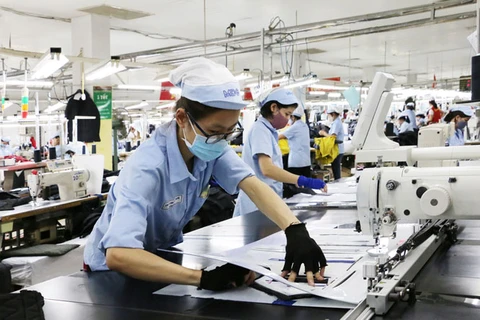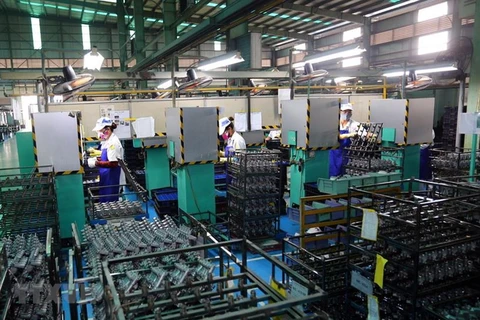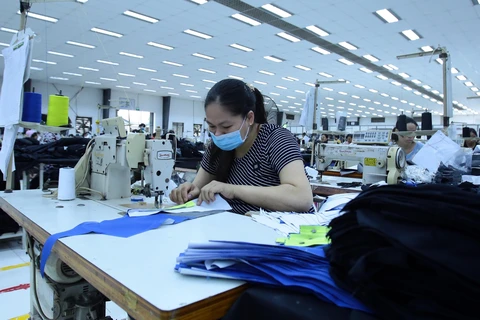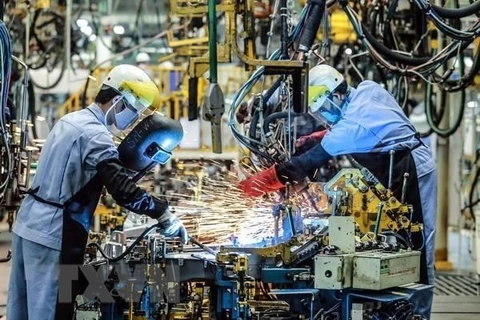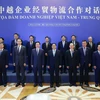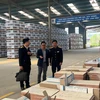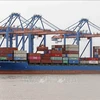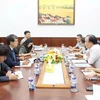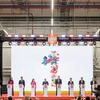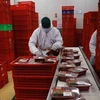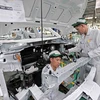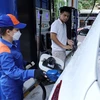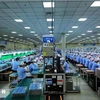Hanoi (VNA) – Garment-textile and footwear are among the hardest hit sectors by the COVID-19 epidemic.
After the traditional Lunar New Year, many garment-textile and footwear businesses have been facing a shortage of materials for production due to the impact of COVID-19.
Director of Ha Tay Chemical Weave Company Nguyen Thanh Tung said though enterprises have been proactively seeking more than 80 percent of materials for production from domestic sources, the remaining was still imported, mainly from China, the Republic of Korea, and China’s Taiwan.
Since the COVID-19 pandemic is spreading in the region, the import of materials for production becomes interrupted, thus triggering a number of difficulties.
“If the sector is unable to import materials from pandemic-hit countries like China and the Republic of Korea, it will be difficult to complete orders for partners,” Tung said.
Deputy Director of Thanh Binh Textile and Garment Trading Company Limited (Long Bien District, Hanoi) Nguyen Thi Binh said her company does not have any problem with the sale of products because for 2020, it has signed contracts to export clothes to Laos and Cambodia. However, the pandemic has made it difficult for the firm to buy materials from China – the main supplier.
Normally, to ensure the completion of the signed contracts, the company must import materials every two weeks. However, under the impact of COVID-19, it has not been able to import raw materials over the past month while the store of this kind of input is also running out.
Given this difficulty, the company had to consider searching for new sources of materials, but it is just a temporary solution, Binh said.
Not only small- and medium-sized enterprises are affected, many major ones in the textile industry are also struggling to ensure materials for production, especially as the industry is dependent on global supply chains.
Than Duc Viet, Director General of Garment 10 Company, said its Chinese material suppliers have yet resumed stable operation.
He added that the firm has forecast worst scenarios for businesses such as cutting working hours and personnel.
To seek alternative supply sources in the short term is difficult, he said, adding that his company is coordinating with partners to ease the problem.
According to the Vietnam Textile and Garment Association (VITAS), the suspension of material import over the past time has affected about 20-30 percent of businesses’ production capacity.
However, the ratification of the EU-Vietnam Free Trade Agreement (EVFTA) and the EU-Vietnam Investment Protection Agreement (EVIPA) by the European Parliament (EP) on February 12 has offered new opportunities for businesses to access European markets and diversify material supply sources.
According to Minister of Industry and Trade Tran Tuan Anh, the EVFTA will create opportunities for Vietnamese enterprises to increase exports via improving competitive edge in the EU.
The ministry is coordinating with relevant agencies to speed up the completion of legal procedures to submit the deal to the National Assembly for ratification so as to create momentum for businesses to expand markets and boost exports, he said.
When the EVFTA is ratified, the EU technology will be a great help for Vietnam to build new supply chains in the EU and globally as well as support the country’s economic restructuring and help improve businesses’ competitiveness, he added.
However, in the long term, he held that it is still necessary to reshape Vietnam's supporting industry and restructure it in a sustainable way so that businesses can take initiative in the domestic supply instead of relying on imports./.


